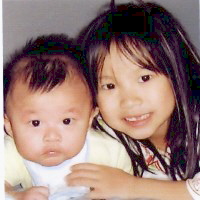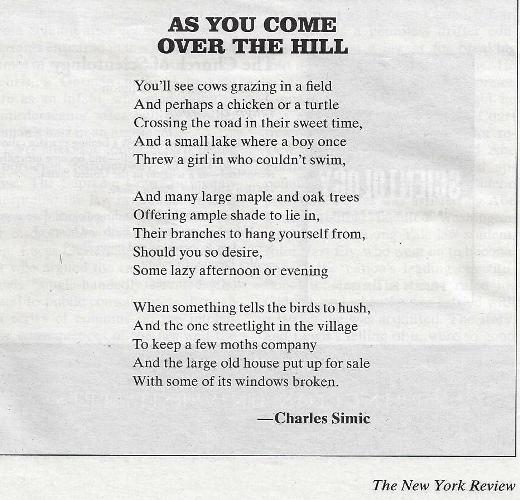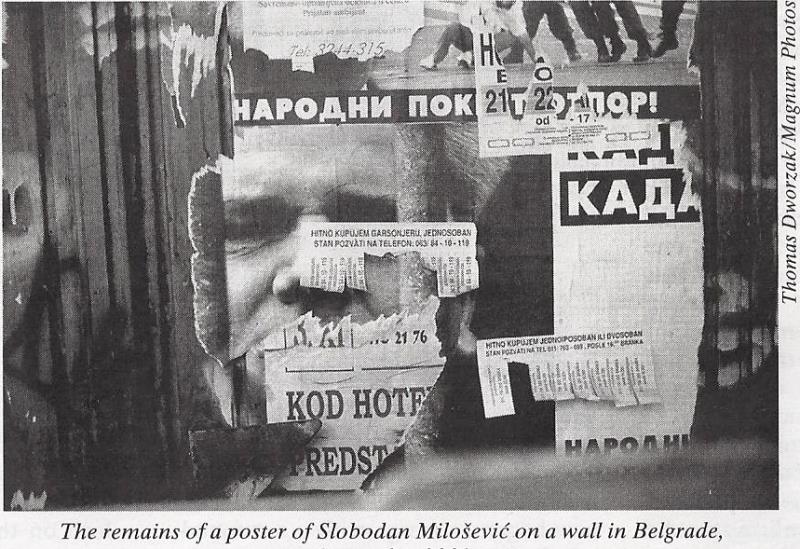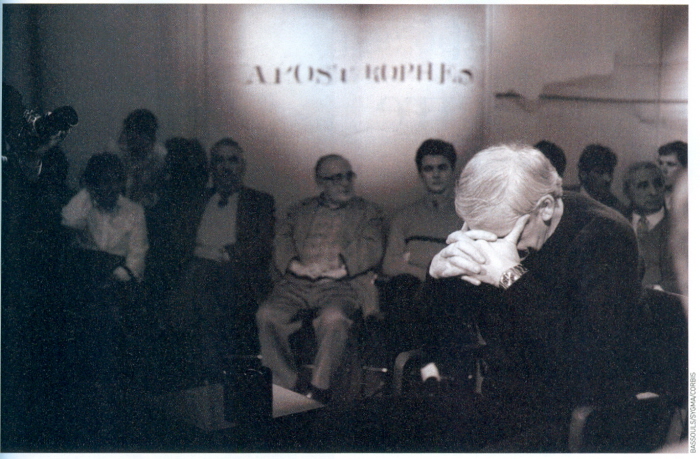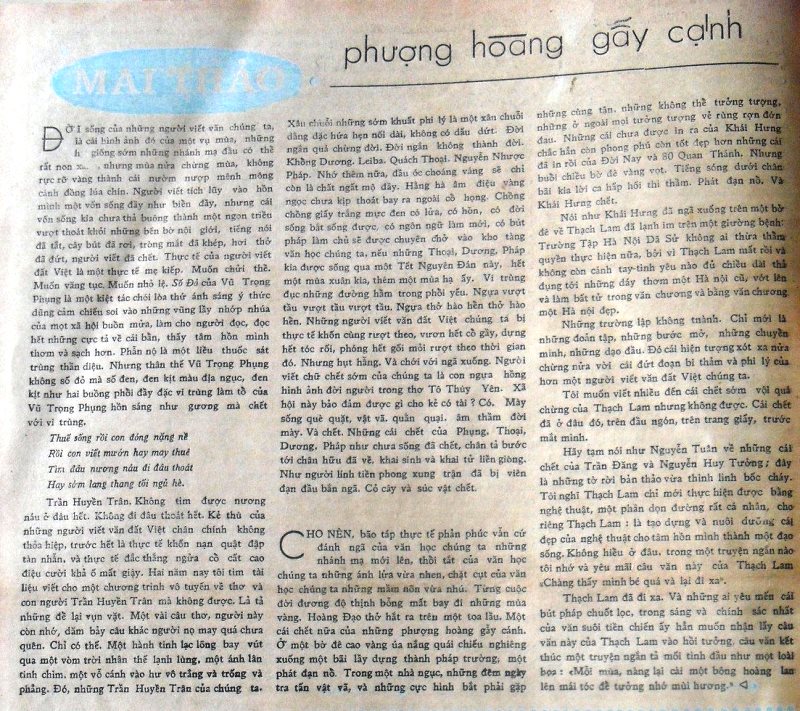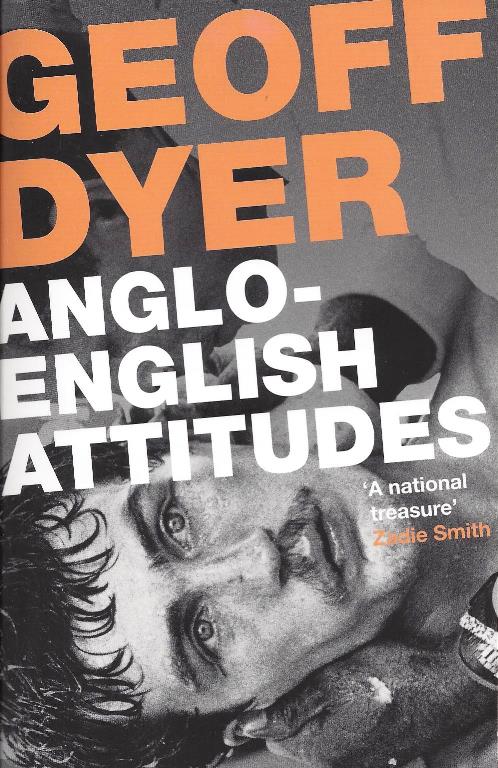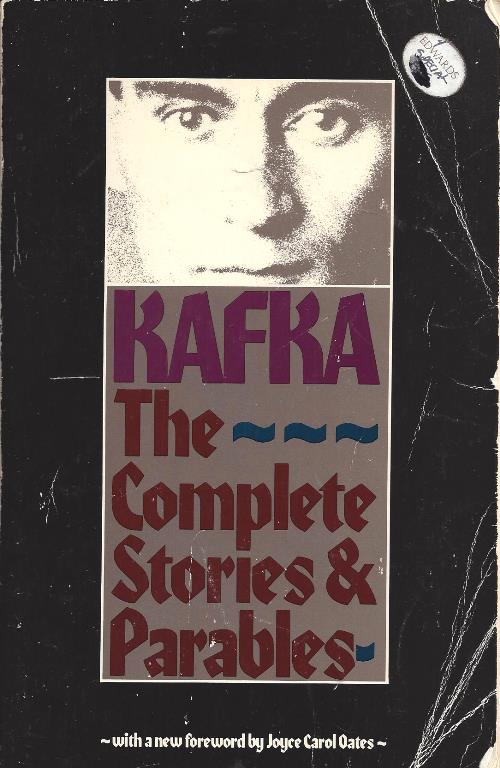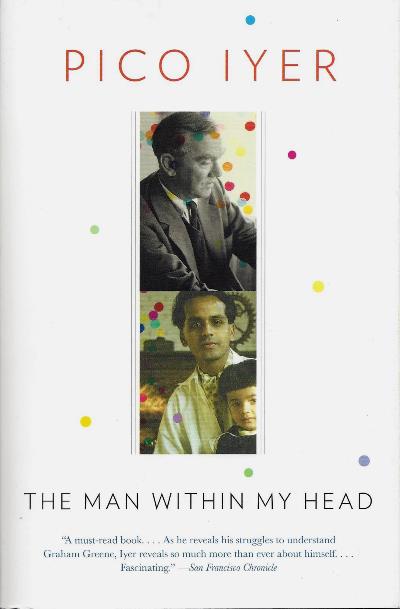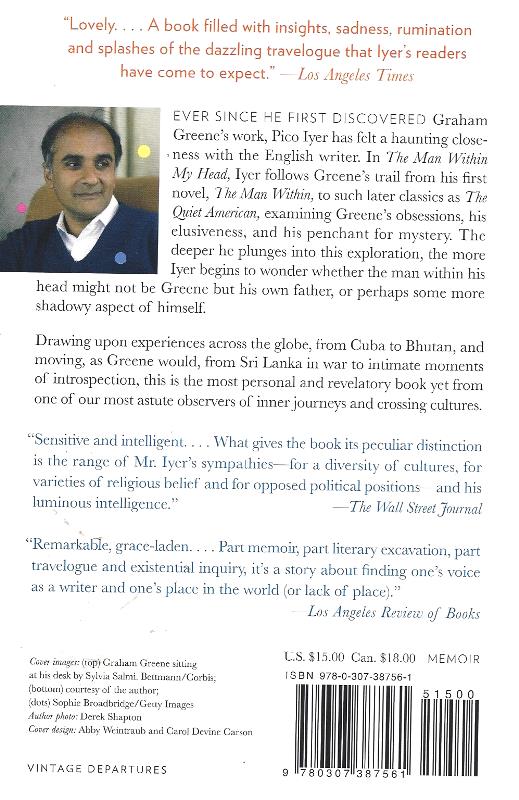|
|
Album | Thơ | Tưởng Niệm | Nội cỏ của thiên đường | Passage Eden | Sáng tác | Sách mới xuất bản | Chuyện văn Dịch thuật | Dịch ngắn | Đọc sách | Độc giả sáng tác | Giới thiệu | Góc Sài gòn | Góc Hà nội | Góc Thảo Trường Lý thuyết phê bình | Tác giả Việt | Tác giả ngoại | Tác giả & Tác phẩm | Text Scan | Tin văn vắn | Thời sự | Thư tín | Phỏng vấn | Phỏng vấn dởm | Phỏng vấn ngắn Giai thoại | Potin | Linh tinh | Thống kê | Viết ngắn | Tiểu thuyết | Lướt Tin Văn Cũ | Kỷ niệm | Thời Sự Hình | Gọi Người Đã Chết Ghi chú trong ngày | Thơ Mỗi Ngày | Chân Dung | Jennifer Video Nhật Ký Tin Văn / Viết Nhật Ký Tin Văn [TV last page] Sách Báo 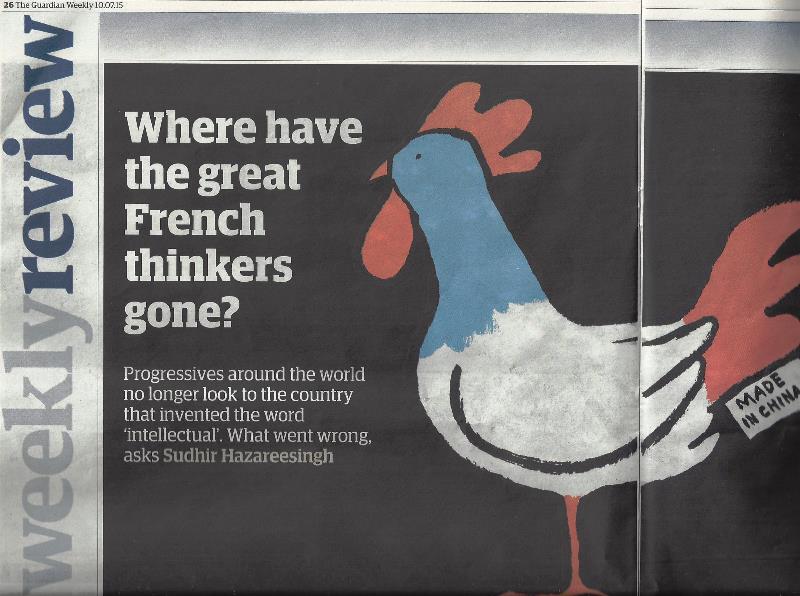 Những “Maitres” của Tẩy ngày nào, nay đâu rồi?
French philosophy has had precious little to offer in recent decades.
Triết Tẩy mấy thập niên gần đây chẳng có gì dâng hiến cho nhân loại, dù tí ti, thực quí hiếm. Liệu Tẩy còn.. suy tư?
Writing after the end of the Second World War, the French
historian Andre Siegfried claimed that French thought had been the driving
force behind all the major advances of human civilization, before concluding
that "wherever she goes, France introduces clarity, intellectual ease, curiosity,
and ... a subtle and necessary form of wisdom". This ideal of a global French
rayonnement (a combination of expansive impact and benevolent radiance) is
now a distant and nostalgic memory. French thought is in the doldrums. French
philosophy, which taught the world to reason with sweeping and bold systems
such as rationalism, republicanism, feminism, positivism, existentialism
and structuralism, has had conspicuously little to offer in recent decades.
Saint -Germain-des-Prés, once the engine room of the Parisian Left Bank's
intellectual creativity, has become a haven of high - fashion boutiques,
with fading memories of its past artistic and literary glory. As a disillusioned
writer from the neighborhood noted grimly: "The time will soon come when
we will be reduced to selling little statues of Sartre made in China!' French
literature, with its once glittering cast of authors, from Balzac and George
Sand to Jules Verne, Albert Camus and Marguerite Yourcenar, has likewise
lost much of its global appeal - a loss barely concealed by recent awards
of the Nobel Prize for literature to JMG Le Clezio and Patrick Modiano. In
2012, the Magazine Littéraire sounded the alarm with an apocalyptic headline:
"La France pense-t-elle encore?" ("Does France still think?")Nowhere is this retrenchment more poignantly apparent than in France's diminishing cultural imprint on the wider world. An enduring source of the French pride is that their ideas and historical experiences have decisively shaped the values of other nations; Versailles in the age of the Sun King was the unrivalled aesthetic and political exemplar for European courts. Caraccioli, the 18th-century author of L'Europe Francaise, expressed a common view when he enthused about the "sparkling 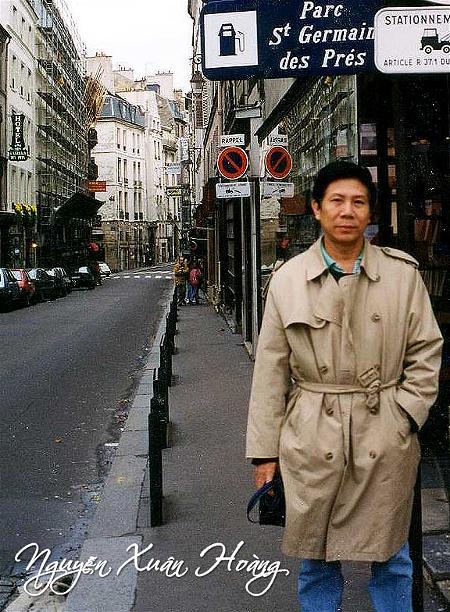
nay trở thành nơi bán hàng hiệu, và chẳng chóng thì chầy, sẽ bày bán, tượng Sartre, như món quà lưu niệm, “made in China”! The forty-five typewritten pages of Franz
Kafka's "Letter to his Father" are, as Carolin Duttlinger says, "the closest
we have to Kafka's memoirs". Now, with the publication of Kafka: Die friihen
Jahre (The early years), Reiner Stach's three-volume, 2,000- page work on
the not quite forty-one years of Kafka's life is complete. "Counteracting
perceptions of Kafka as somewhat removed from the major events of his time",
Stach shows "how Kafka's life story is closely entwined with ... the fabric
of modernity"; the trilogy is "a true landmark of biographical scholarship".
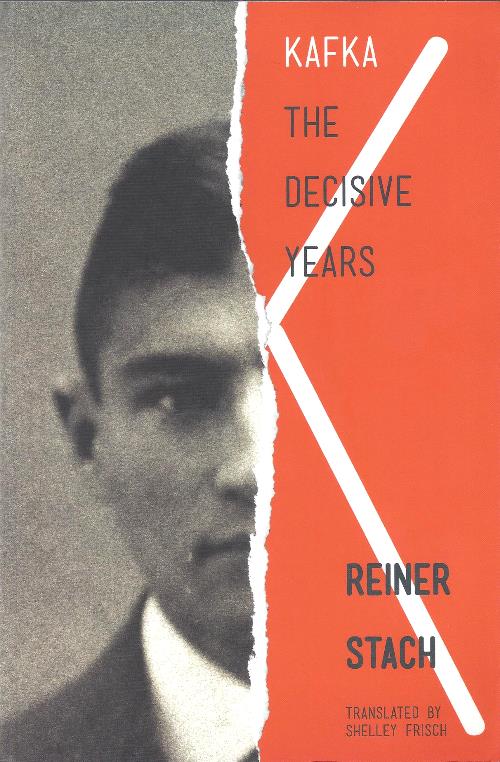 Kafka, Những năm quyết
định.
Đám điểm sách, nhà văn, phê bình gia, toàn thứ dữ, khen cuốn này thấu trời, đành phải bệ về! Farewell,
you little street, Two weeks
later, he [Brod] received a piece of poetry from Jungborn. It was just
as
"pure," but in a very different way. It was a popular song that Kafka
had sung along to a few times without being able to get the melody
quite right.
It was called "In the Distance" and was about as old as Kafka
himself. This song, by Albert Graf von Schlippenbach, was folksy, which
is a
euphemism for trivial. Yet it cut Kafka to the quick. Just a few months
later,
he confessed to a woman that he was "in love" with this song. He sent
her a copy of the text but asked to have it back because he could not
do
without it; "pure emotion" had been rendered in perfect form in this
text. Without further
elaboration, he added, "And I can swear that the poem's sorrow is
genuine." Reiner Stach:
Kafka: The Decisive Years Translated [from
German] by Shelley Frisch 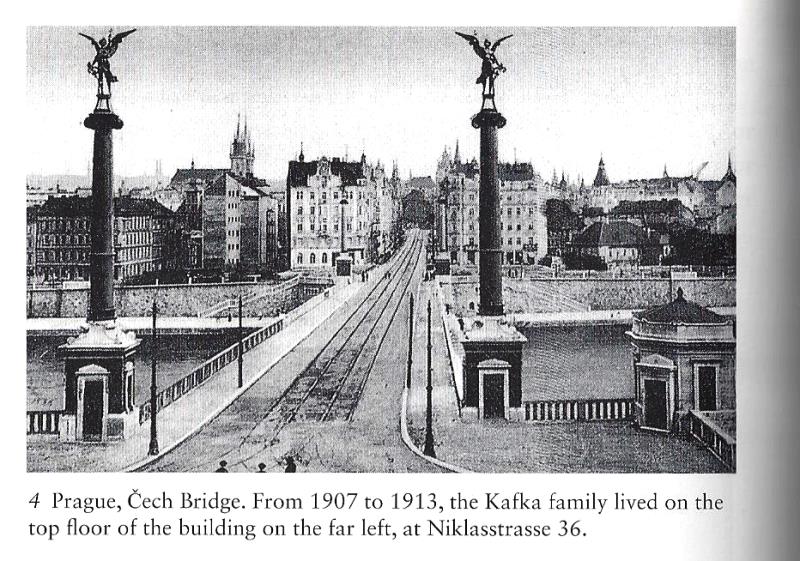 Chapter 23 Literature,
Nothing but Literature I have known
for many years -ILSE
AICHINGER, EISKRISTALLE Không viết là cái phần căng nhất, dài nhất, trong cái nghề này.
Sweet Home Alabama
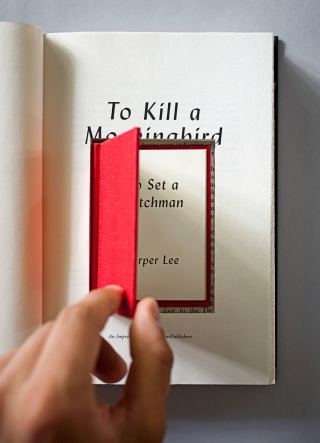 The New Yorker đọc cuốn tiểu thuyết mới kiếm thấy của tác giả “Giết con chim nhại”. Then Scout asks, “Did you hate us?,” and Calpurnia shakes her head no. This is credible. But the scene, and the book, would have been stronger if she hadn’t. ♦ Rồi Scout hỏi " Chị có ghét chúng tôi không ?" và Calpurnia lắc đầu "không" . Điều này có thể tin được . Nhưng cái cảnh này, và cả cuốn sách, sẽ "bảnh" hơn nhiều nếu chị ta đừng lắc đầu . Làm nhớ Faulkner: Hãy Nói Về Miền Nam "Tại sao anh thù ghét Miền Nam?", Shreve McCannon hỏi, sau khi nghe xong câu chuyện – "Tôi không thù Miền Nam", Quentin trả lời liền lập tức. "Tôi không thù Miền Nam," anh lập lại, như thể nói với tác giả, và với chính mình. Tôi không thù …. Tôi không. Tôi không thù! Tôi không thù! William Faulkner. Absalom, Absalom! (1936) Có thể, Adam Gopnik, cũng nghĩ tới Faulkner, khi kết thúc bài điểm sách của ông. Note: Bài trên The Economist, của Prospero, đọc thú hơn. Tay này, quả là 1 cao thủ trong giới điểm sách. Harper Lee’s new novel Scout grows up http://www.economist.com/blogs/prospero/2015/07/harper-lee-s-new-novel Jul 14th 2015, 11:24 by The Economist FOR more than half a century “To Kill a Mockingbird” has been revered as a literary classic, the story of Scout and Jem Finch, a young sister and brother (and their naughty friend, Dill Harris, based on Truman Capote) who are all trying to make sense of the bewildering, bigoted American South in the 1930s. The novel sold 40m copies, won a Pulitzer prize and was made into a much-loved film, starring Gregory Peck as the siblings’ father, Atticus Finch, a heroic white lawyer who defends a black man accused of raping a white woman. Its fame was enhanced by what happened to its author, Harper Lee, who was only 34 when the book came out. Now 89 and living in a home, she has turned down every interview request for more than 50 years. For decades it was thought that Ms Lee had written nothing else. But in 2014 her lawyer, Tonja Carter, discovered an unpublished manuscript titled “Go Set a Watchman”. The book was released on July 14th with simultaneous editions translated into seven languages. Six months of teasers from her publishers ensured it was the publishing moment of the year, with early orders approaching Harry Potter levels. The novel is being touted as a sequel to “Mockingbird”, but it would be truer to call it an early prototype. Instead of a child, Scout is a 26-year-old woman who works in New York and has gone home on holiday, much as Ms Lee herself might have done at the time. Tay Hohoff, her legendary editor, read the draft in 1957 and wisely advised the fledgling author to rewrite the book, fleshing out the scenes of Scout’s childhood. Early reactions to the new release have focused on the shocking disclosure that Atticus Finch, far from being a hero, is an uneasy segregationist who once attended a Ku Klux Klan meeting. As one fan tweeted, “It’s like hearing that Santa Claus beat his deer.” The book’s evolution from “Watchman” into “Mockingbird” in less than three years is remarkable. To put it into context, a lot of novels are dreadful, and most are ordinary. Even the 150 or so submitted for the Man Booker prize every year—supposedly the cream of literary publishing—are a mixed bunch. Only a handful, if that, could be considered great. “Go Set a Watchman” is one of the ordinary ones. It has flashes of delight—the 14-page account of a ladies’ coffee morning is particularly hilarious. But many of the characters are one-dimensional and they spout long speeches, chiefly about race, that feel both unfinished and undigested. That Atticus Finch should reveal himself to his adult daughter as a racist bigot, rather than the moral giant of “Mockingbird”, can only have been written by someone who had not had a child or seen at first hand the inexorable nosiness of the young, whether about their parents’ motives or their sex lives. The most surprising thing about “Go Set A Watchman”, then, is how a young writer, so rooted in the customs and mores of her time and seemingly with no sense of drama or history, was able to transform a first novel from a pedestrian piece of prose into a soaring work that has enthralled millions through the decades. It makes one want to salute the human imagination—and weep that she never wrote more. Bài sau đây, cũng của Prospero, viết về văn học Israrel, cũng thật OK. Cái "open wound" của nó, liệu có giống của VC không, khi chúng không làm sao "đọc đúng" văn chương Miền Nam trước 1975. Mỗi lần đọc, là chúng bèn thiến những gì cần đọc Israeli literature
http://www.economist.com/blogs/prospero/2015/07/israeli-literature All change
ISRAEL has been immigrant-based from its founding, but the country’s cultural output has not always reflected that diversity. Ashkenazi Jews with roots in central and eastern Europe formed the country’s early elites, and art, literature and film often sought to assimilate newcomers. But a recent spate of literary awards suggest this may be changing. Earlier this year there was a furore when the country’s Sapir prize went to Reuven Namdar, a Jew whose family came to Israel from Iran, but who now lives in New York. The winner of this year’s Israeli Prize in Literature, Erez Biton, is a Jewish poet whose family emigrated from the Arab world and who was born in Algeria. Dalia Betolin-Sherman, an emigre from Ethiopia (pictured above), won the 2014 Ramat Gan prize for her first collection of stories. One of the country’s most popular writers, Sayed Kashua, is a Muslim Israeli Arab who writes in Hebrew. A novelist, television writer and newspaper columnist, he is based in Illinois. While such writers' location, ethnicity and religion differ, they have all primarily written in Hebrew. But the nearly 1m Russian emigres who moved to Israel in the 1990s have their own thriving literary community and publish novels in Russian about life in their adopted home. What defines Israeli literature as “Israeli” is increasingly up for debate. “Israeli literature should reflect reality as it is today," argues Ms Betolin-Sherman, "and not necessarily be the same thing it was 60 years ago.” Her own story collection—“When the World Became White”—focuses on the country’s 135,000-strong Ethiopian Jewish minority and is due to be published in English by Penguin in 2017. 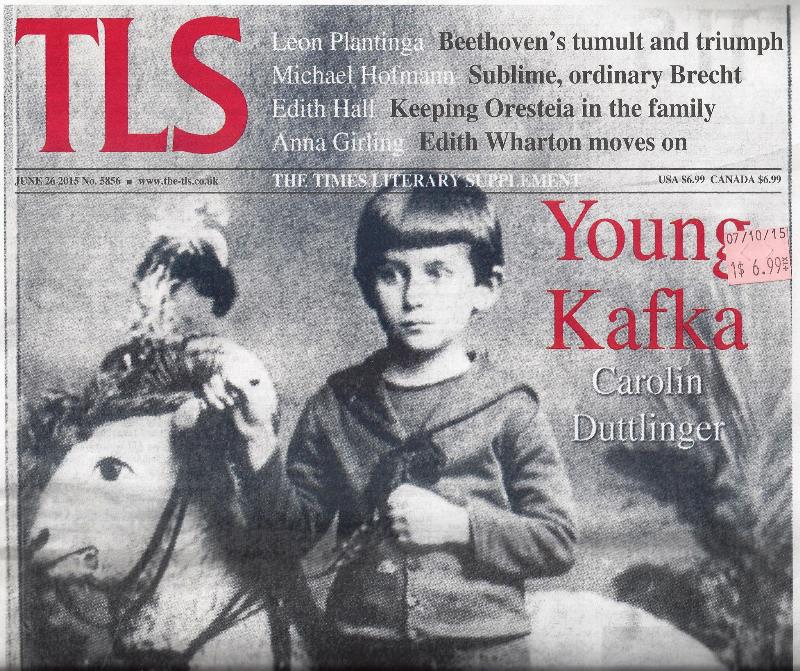
The forty-five typewritten pages of Franz
Kafka's "Letter to his Father" are, as Carolin Duttlinger says, "the closest
we have to Kafka's memoirs". Now, with the publication of Kafka: Die friihen
Jahre (The early years), Reiner Stach's three-volume, 2,000- page work on
the not quite forty-one years of Kafka's life is complete. "Counteracting
perceptions of Kafka as somewhat removed from the major events of his time",
Stach shows "how Kafka's life story is closely entwined with ... the fabric
of modernity"; the trilogy is "a true landmark of biographical scholarship".
 Tờ Guardian có bài, triết gia Tẩy, đâu hết rồi, thật là tuyệt. Bèn đi liền. 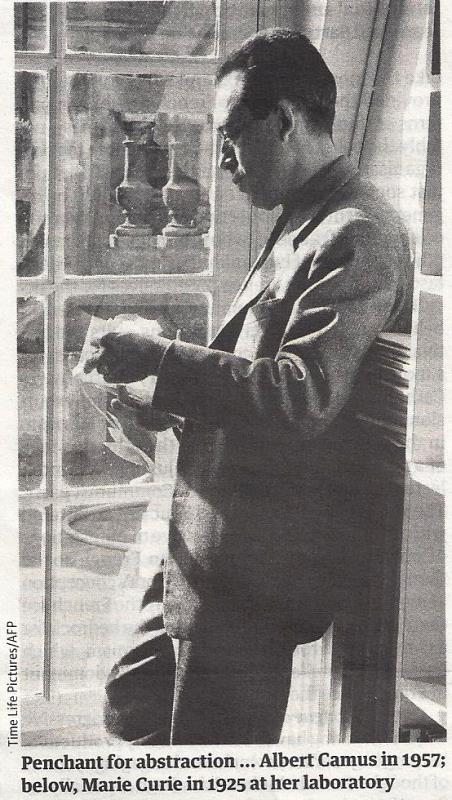
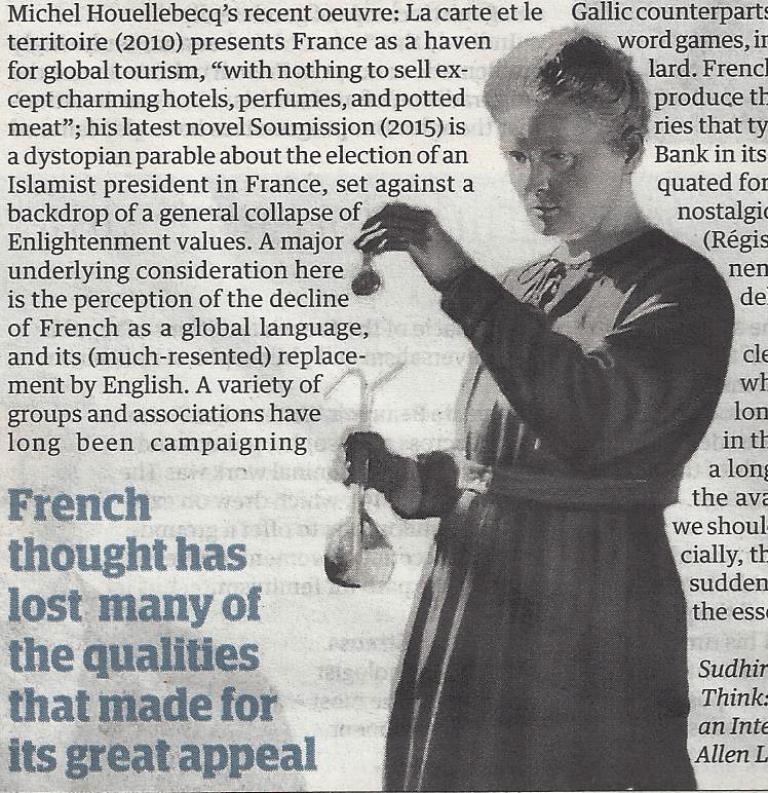
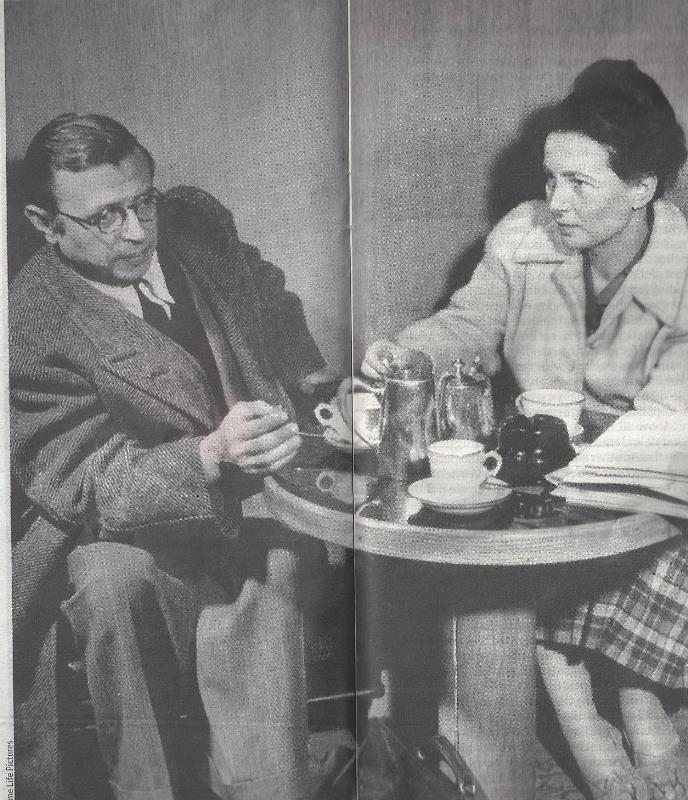
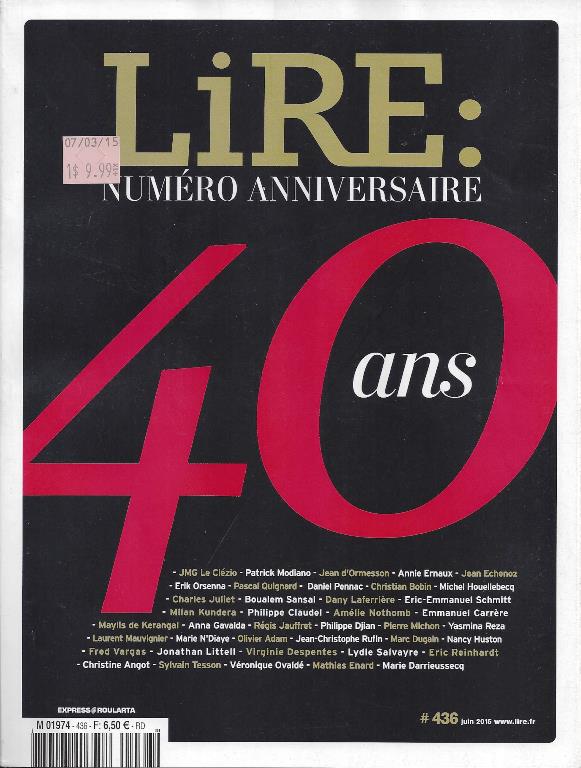
 Charles Simic, New York City, May 1996
Hầu như “tất
cả” những bài thơ trong “The Lunatic” đã được Tin Văn dịch, lai rai
trước đó,
chôm từ những tạp chí, và, khi cuốn thơ được xb, làm trọn cả ổ. Cũng không
cho đọc free, là 1 bài thật OK, của Vargas Llosa, trong 1 cuốn sách sẽ
xb trong
những ngày sắp tới. Trên tờ Harper's Lạ, là bài
viết làm Gấu nhớ tới thời gian mới tới Trại Cấm Thái Lan, chưa từng
biết phim
sex là cái gì, bữa đó, nghe 1 em Bắc Kít, hình như là 1 nữ
thương gia
làm ăn thất bát, hoặc, vượt biển theo bồ, 1 anh chàng hình như gốc Tẫu,
quen
thân tay Trưởng Trại Thái Lan, Gấu lúc đó làm tên dậy tiếng Anh cho
những vì học
trò thần thế như thế. Gấu không
làm sao hiểu được phim “séc” là phim gì. Thú nhất là
lần ở tù VC, nghe 1 ông, bạn tù kêu là ông Sơn Mê Ô, cứ tưởng gốc
Tẩy, chỉ đến
khi ông hút điếu thuốc lào thì mới hiểu, đây là ông “Sơn Méo”, vì
ông hút lệch
hẳn miệng qua 1 bên, chỉ một nửa điếu thuốc lào, nửa còn lại là của 1
ông đang
ngồi chờ đến phiên mình! Tuyệt nhất, trong The Lunatic, với riêng Gấu, là bài Lên Đồi Hóng Gió. Thảm nhất, là bài kế tiếp,
dưới đây.
NYRB May 9,
2013
Bạn sẽ thấy bò gặm cỏ trên
đồng
Và có lẽ, một chú gà con, hay một con rùa Băng qua đường trong cái khoảng thời gian Ui chao thật là ngọt ngào của chúng Và một hồ nhỏ, nơi có lần một đấng con trai Ném cô gái của mình xuống đó Cô gái, tất nhiên, đếch biết bơi! Hà, hà! Và rất nhiều cây phong to tổ bố, và sồi Xoè cái váy của chúng ra, Là cái bóng dâm rộng lùng thùng là những tầng lá Để bạn nằm lên đó Còn những cành cây, là để bạn treo tòng teng bạn lên Thì cứ giả như bạn đang thèm Một buổi xế trưa lười biếng hay, Quá tí nữa, 1 buổi chiều. Khi một điều gì đó nói, bầy chim, im đi Và ngọn đèn đường độc nhất ở trong làng, Giữ mấy con bướm đêm làm bạn đường Và ngôi nhà thật rộng, cũ mèm, để biển bán Với mấy cửa sổ bể, gãy, tan hoang. Bài thơ có bề ngoài giống y chang 1 bài ca dao, thí dụ bài “Trèo lên cây bưởi hái hoa”, ở đây, là lên đồi ngắm cảnh. Những “tỉ” những “hứng” có đủ cả… Nói theo Kim Dung, thì chúng là những đòn gió, chỉ để bất thình lình ra đòn sau cùng, đòn chí tử, là khổ thơ chót. Đọc, sao mà thê lương chi đâu: When something tells the birds to hush, And the one streetlight in the village To keep a few moths company And the large old house put up for sale With some of its windows broken. Quái làm
sao, câu thơ đầu,
“khi một điều gì đó nói lũ chim câm đi”, làm Gấu nhớ đến cái mail chót,
của 1 nữ thi sĩ, “mi làm phiền ta quá”… “kiếp trưóc mi đúng là con
đỉa”….
Hà hà! Nhưng cái mail kế chót thì thật là tuyệt vời. Em quả có tí thương [hại] Gấu! Passing
Through An
unidentified, London
Review of Books 9 May 2013 Quá Giang Một tên nào
đó Ui chao đọc
bài thơ này, thì lại nhớ, 1 lần, Gấu nằm mơ, sống lại những ngày Mậu
Thân, cực
kỳ thê thảm, và hình như khóc khủng khiếp lắm. Phải mãi sau
này, khi nghĩ lại cái lần Gấu xin gặp mặt, nhân cả hai cùng ghé Tiểu
Sài Gòn, và
nghe trả lời, mi muốn gặp ta ư, thì đến dự bữa tiệc ra mắt sách của nhà
văn gì gì đó,
nhà xb Cờ Lăng, ta làm MC, ở…. Gấu mới té ngửa, tại làm sao mà lại có
sự
lầm lẫn
lớn lao như thế này. Hoá ra cuộc tình "giả" như
thế - thì có gì thực đâu – mà cực kỳ thê lương, đó là vì nó được cuộc
chiến, trong có hai tên
sĩ quan
Ngụy, một, là thằng em trai, một, là người chồng, làm nền cho nó. Some of
Simic's most powerful, expressive prose can be found in three essays
that deal
with the breakup of Yugoslavia. His opposition to any utopian project,
including nationalism, which would place a collective interest above
the safety
of the individual, is unremitting. As Slobodan Milosevic was taking
power in
Serbia, Simic warned early on that he was "bad news," and for his
pains was denounced by Serbian nationalists as a traitor. His answer:
"The
lyric poet is almost by definition a traitor to his own people." As he
saw
it, "sooner or later our tribe always comes to ask us to agree to
murder," which is one good reason he has resisted tribal identification
with a passion: "I have more in common with some Patagonian or Chinese
lover of Ellington or Emily Dickinson than I have with many of my own
people." Leery of all generalizations, he insists again and again that
"only the individual is real." As the civil war heated up, he found
that his appeals to forgiveness and reasonableness were met with total
incomprehension and finally hatred. Simic, living in America, became
the target
of rumors: My favorite
one was that the CIA had paid me huge amounts of money to write poems
against
Serbia, so that I now live a life of leisure in a mansion in New
Hampshire
attended by numerous black servants. If he is
still able to extract wry humor from the situation, elsewhere he rises
to a
furious eloquence. There is no longer any hint of mystery or the
"unsayable" in these political essays; he knows exactly what he wants
to say: All that became obvious to
me watching the dismemberment of Yugoslavia,
the way opportunists of every stripe over there instantly fell behind
some vile
nationalist program. Yugoslav identity was enthusiastically canceled
overnight
by local nationalists and Western democracies in tandem. Religion and
ethnicity
were to be the main qualifications for citizenship, and that was just
dandy.
Those who still persisted in thinking of themselves as Yugoslavs were
now
regarded as chumps and hopeless utopians, not even interesting enough
to be
pitied. In the West many jumped at the opportunity to join in the fun
and
become ethnic experts. We read countless articles about the rational,
democratic, and civilized Croats and Slovenes, the secular Moslems,
who, thank
God, are not like their fanatic brethren elsewhere, and the primitive,
barbaric, and Byzantine Serbs and Montenegrins .... `With finely controlled
sarcasm, Simic
demonstrates the advantages of an emigre's double vision. It enables
him to see
how his uncle Boris "had a quality of mind that I have often found in
Serbian men. He could be intellectually brilliant one moment and
unbelievably
stupid the next." If Simic is finally harder on the Serbs, despite
acknowledging that there were war criminals in every faction, he
explains:
"Nonetheless, it is with the murderers' in one's own family that one
has
the moral obligation to deal first." a larger
setting for one's personal experience. Without some sort of common
belief,
theology, mythology-or what have you-how is one supposed to figure out
what it
all means? The only option remaining, or so it seems, is for each one
of us to
start from scratch and construct our own cosmology
as we lie in bed at night. At age seventy-seven he is still starting from scratch, and writing in bed, his favorite writing spot, alone with the moth, there being, as he sees it, no other option. + Nhà thơ trữ
tình thì hầu như ngay từ định nghĩa, 1 tên phản bội nhân dân của nó,
chẳng sớm
thì muộn, bộ lạc sẽ tới đề nghị anh ta làm đao phủ thủ. How
important is Milan Kundera today? In the 1980s
everybody was reading The Unbearable Lightness of Being and The Book of
Laughter and Forgetting. But, as he publishes a novel for the first
time in a
dozen years, what is the Czech writer’s reputation today – and is it
irretrievably damaged by his portrayal of women? Danh tiếng Kundera ngày
nay ra sao? (*) Trong những năm 1980 mọi người đều
đọc Đời nhẹ khôn kham (The Unbearable Lightness of Being)
và Cười cợt và quên lãng (The Book of
Laughter
and Forgetting).
Nhưng, khi ông xuất bản cuốn
tiểu thuyết đầu tiên sau hàng chục
năm,
danh tiếng của nhà văn gốc Tiệp này ngày nay ra sao – phải
chăng nó
đã bị hủy hoại không thể cứu vãn do cách miêu tả phụ nữ của
ông? Câu tiếng Việt, nhảm. Ý của nó như vầy, "Nhưng, khi ông xuất bản cuốn tiểu thuyết, lần đầu tiên, sau cả chục năm [bặt tiếng], thế giá của ông bây giờ như thế nào - liệu nó có bị sứt mẻ trầm trọng, hết thuốc chữa, do cách ông miêu tả người phụ nữ?" Cái tít tiếng
Việt cũng nhảm. Tiếng Anh, “sự quan trọng của Kun bây giờ như thế nào”,
là ý muốn
nói, ông này, từ lò CS chui ra, viết 1 cú là nổi như cồn, vì những câu
phán cực
là bảnh tỏng, như "chân lý nước Việt Nam là một", thí dụ, “The struggle
of man against power is the
struggle of
memory against forgetting”, cuộc chiến đấu của con người chống lại
quyền lực là
cuộc chiến đấu của hồi nhớ chống lại sự lãng quên; bây giờ sự quan
trọng của ông như thế nào, là ý đó. Gấu có thể là
người đầu tiên giới thiệu Kun với độc giả hải ngoại, nhưng chắc chắn,
là người đầu
tiên khui ra chi tiết này, trong thế giới toàn trị vách nhà giam dán
đầy thơ, và
mọi người nhẩy múa trước những bài thơ đó, và VC Bắc Kít bảnh hơn cả
"Bố của
VC", tức Liên
Xô, bởi là vì ở Liên Xô, ngai vàng Điện Cẩm Linh được thi sĩ và đao phủ
thủ cùng ngồi, nhưng ngai vàng ở Bắc Bộ Phủ, một mình Văn Cao là đủ! Với tôi, hay
nhất ở Phạm Duy, vẫn là những bản nhạc tình. Ông không thể, và chẳng
bao giờ muốn
đến cõi tiên, không đẩy nhạc của ông tới tột đỉnh như Văn Cao, để rồi
đòi hỏi
"thực hiện" nó, bằng cách giết người. Một cách nào đó, "tinh thần"
Văn Cao là không thể thiếu, bắt buộc phải có, đối với "Mùa Thu", khi
mà nhà thơ ngự trị cùng với đao phủ. Kundera đã nhìn thấy điều đó ở
thiên tài
Mayakovsky, cũng cần thiết cho Cách mạng Nga như trùm cảnh sát, mật vụ
Dzherzhinsky. (Những Di chúc bị Phản bội). Nhạc không lời, ai cũng đều
biết, mấy
tướng lãnh Hitler vừa giết người, vừa ngắm danh họa, vừa nghe nhạc cổ
điển. Cái
đẹp bắt buộc phải "sắt máu", phải "tyranique", (Valéry). Phạm
Duy không nuôi những bi kịch lớn. Ông tự nhận, chỉ là "thằng mất dậy"
(trong bài phỏng vấn kể trên). Với kháng chiến, Phạm Duy cảm nhận ngay
"nỗi
đau, cảnh điêu tàn, phía tối, phía khuất", của nó và đành phải từ chối
vinh quang, niềm hãnh diện "cũng được chính quyền và nhân dân yêu lắm".
Những bài kháng chiến hay nhất của Phạm Duy: khi người thương binh trở
về. Ở
đây, ngoài nỗi đau còn có sự tủi hổ. Bản chất của văn chương "lưu vong,
hải
ngoại", và cũng là bản chất của văn chương hiện đại, khởi từ Kafka, là
niềm
tủi hổ, là sự cảm nhận về thất bại khi muốn đồng nhất với đám đông, với
lịch sử,
với Mùa Thu đầu tiên của định mệnh lưu vong. Phạm Duy muốn
làm một người tự do tuyệt đối nên đã bỏ vào thành. Nhưng Văn Cao, chỉ
vì muốn đồng
nhất với tự do tuyệt đối, nên đã cầm súng giết người. Thiên tài
Mayakovski cần
thiết cho Cách Mạng Nga cũng như trùm công an mật vụ, là vậy. "Mặt trời
chân lý chiếu qua tim". (Tố Hữu). Tính chất trữ tình không thể thiếu,
trong thế giới toàn trị (totalitarian world): Tự thân, thế giới đó
không là ngục
tù, gulag. Nó là ngục tù, khi trên tường nhà giam dán đầy thơ và mọi
người nhẩy
múa trước những bài thơ đó, (Kundera, sđd).
Kundera
« Ce n'était
pas seulement le temps de l'horreur, c'était aussi le temps du lyrisme!
Le
poète régnait avec le bourreau ". Thời Của Văn Cao: Thi sĩ lên ngôi trị vì cùng với đao phủ. Roman
= poésie antilyrique Michael
Hofmann The Festival
of Insignificance by Milan Kundera, translated by Linda Asher Faber, 115
pp, £14.99, June, ISBN 978 0 571 31646 5 Tờ LRB,
Michael Hofmann đọc “Lễ Hội Cà Chớn” của Kun.“Cũng” chê. Hết thời rồi. Thập niên 80 là của Kun. Khi bạn không kịp
đọc cuốn cũ, thì có ngay cuốn mới. Nhưng
bạn
trẻ ơi, young reader, tôi – Michael Hofmann - hết đọc rồi. Ít ra, hết
đọc Kun,
no more Kundera!
[Essay] ARS EROTICA By Mario
Vargas Llosa, from Notes on the Death of Culture: Essays on Spectacle
and
Society, out next month from Farrar, Straus and Giroux. Vargas Llosa,
who is
the author of more than a dozen novels, received the Nobel Prize for
Literature
in 2010. Translated
from the Spanish by John King. A few years ago, a small media storm erupted in Spain when the Socialist government in the region of Extremadura introduced, as part of its sex-education curriculum, masturbation workshops for girls and boys over the age of thirteen-a program that it somewhat mischievously called Pleasure Is in Your Own Hands. Faced with protests, the regional government argued that sex education for children was necessary to "prevent undesirable pregnancies" and that masturbation classes would help young people "avoid greater ills." In the ensuing debate, the regional government of Extremadura received support from the regional government of Andalucfa, which announced that it would soon roll out a similar program. An attempt by an organization close to the Popular Party to close down the masturbation workshops by way of a legal challenge-called, equally mischievously, Clean Hands-failed when the public prosecutor's office refused to take up the complaint. How things have changed since my childhood, when the Salesian fathers and La Salle brothers who ran the schools scared us with the idea that "improper touching" caused blindness, tuberculosis, and insanity. Six decades later schools have jerking-off classes. Now that is progress. But is it really? I acknowledge the good intentions behind the program and I concede that campaigns of this sort might well lead to a reduction in unwanted pregnancies. My criticism is of a sensual nature. Instead of liberating children from the superstitions, lies, and prejudices that have traditionally surrounded sex, might these masturbation workshops trivialize the act even more than it has already been trivialized in today's society? Might they continue the process of turning sex into an exercise without mystery, dissociating it from feeling and passion, and thus depriving future generations of a source of pleasure that has long nurtured human imagination and creativity? Masturbation does not have to be taught; it can be discovered in private. It is one of the activities that compose our private lives. It helps boys and girls break out of their family environment, making them individual and revealing to them the secret world of desire. To destroy these private rituals and put an end to discretion and shame-which have accompanied sex since the beginning of civilization-is to deprive sex of the dimension it took on when culture turned it into a work of art. The disappearance of the idea of form in sexual matters-like its disappearance from art and literature-is a kind of regression. It reduces sex to something purely instinctive and animalistic. Masturbation classes in schools might do away with stupid prejudices, but they are also another stab at the heart of eroticism- perhaps a fatal one. And who would benefit from eroticism's final death? Not the libertarians and the libertines, but the puritans and the churches. Of course, these workshops are only a minor manifestation of a sexual liberation that is among modern democratic' society's most important achievements. They are another step in the ongoing effort to do away with the religious and ideological restrictions that have constrained sexual behavior from time immemorial, causing enormous suffering. This movement has had many suite Bài tiểu luận
của Vargas Llosa về nghệ thuật sex, cực thú vị. Nó làm Gấu nhớ tới lần
đầu tiên
biết may tay, nhờ ông cậu, Cậu Hồng, ông con trai độc nhất của Bà Trẻ
của Gấu. Ông
gọi nó là ‘rung’, “nghệ thuật rung”, nói theo Thầy Vargas Llosa!  * aristos is
taken from the ancient Greek. It is singular and means roughly 'the
best for a
given situation'. It is stressed on the first syllable. 35. Emily
Dickinson: If summer were an axiom, what sorcery had snow?
* * Emily
Dickinson. Nữ thi sĩ lớn, cô đơn, Mẽo, người mà cái đòi hỏi sáng ngời
của nghịch biện thì được hôn phối với cái đốn ngộ sâu sa về bản chất
của nỗi
khổ đau của con người. John Fowles
chỉ mê hai nhà thơ, I think of two poets whose poetry I have a special
love
for: Catullus and Emily Dickinson. 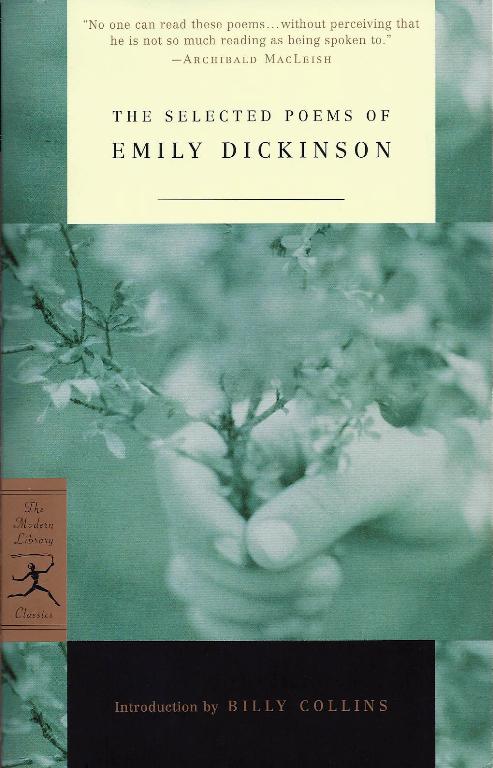 I died for
beauty; but was scarce
Adjusted in the tomb, When one who died for truth was lain In an adjoining room. He questioned softly why I failed? "For beauty," I replied. "And I for truth-the two are one; We brethren are," he said. And so, as kinsmen met a night, We talked between the rooms, Until the moss had reached our lips, And covered up our names. 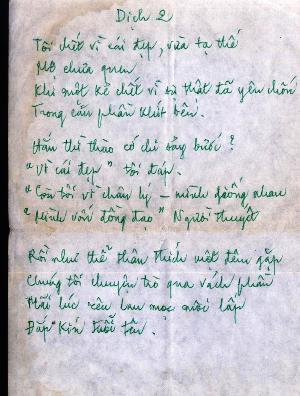 Emily Dickinson: An Introduction Bây giờ
Emily Dickinson được nhìn nhận, không chỉ như 1 nhà thơ lớn của Mẽo,
thế kỷ 19,
nhưng còn là nhà thơ quái dị, gợi tò mò, intriguing, nhất, ở bất cứ
thời nào,
hay nơi nào, cả ở cuộc đời lẫn nghệ thuật của bà. Tiểu sử ngắn gọn về
đời bà thì
cũng có nhiều người biết. Bà sinh ở Amherst, Mass, vào năm 1830, và,
ngoại trừ
vài chuyến đi xa tới Philadelphia, Washington, Boston, bà trải qua trọn
đời mình, quanh quẩn nơi căn nhà của người cha. “Tôi không vượt quá
mảnh đất của
Cha Tôi – cross my Father’s ground - tới bất cứ một Nhà, hay Thành
Phố”, bà viết
về cái sự thụt lùi, ở ẩn, her personal reclusiveness, khiến ngay cả
những người
cùng thời của bà cũng để ý, noticeable. Tại căn phòng ngủ ở một góc
phía
trước căn nhà, ở đường Main Street, Dickinson viết 1,700 bài thơ,
thường là trên
những mẩu giấy, hay ở phía sau một tờ hóa đơn mua thực phẩm, chỉ một
dúm được
xuất bản khi bà con sống, và như thế, kể như vô danh. Theo như kể lại,
thì bà
thường tặng, give, thơ, cho bạn bè và láng giềng thường là kèm với
những cái bánh,
những thỏi kẹo, do bà nướng, đôi khi thả chúng xuống từ 1 cửa sổ phòng,
trong 1
cái giỏ. Cái thói quen gói những bài thơ
thành 1 tập nho nhỏ, fasciles, cho thấy, có thể bà cho rằng thơ thì
trình ra được,
presentable, nhưng hầu hết thơ của bà thì đều không đi quá xa cái bàn
viết, ở
trong những ngăn kéo, và chúng được người chị/hay em, khám phá ra, sau
khi
bà mất vào năm 1886, do “kidney failure”. John
Fowles, trong The Aristos: A Self-Portrait in Ideas, Poems...
nhân mùa World Cup 1966, đã đưa ra nhận xét:
Trước Cuộc Truy Hoan
"Bóng đá gồm 22 cây gậy [của tên ăn mày, như các cụ thường nói], đuổi theo một cái âm hộ; cái chày của môn chơi golf là một dương vật cán bằng thép; vua và hoàng hậu trong môn cờ là Laius và Jocasta, mọi chiến thắng đều là một dạng, hoặc bài tiết hoặc xuất tinh." Có thể nói, văn chương nghệ thuật Tây phương bắt đầu, bằng cuộc tranh giành một nàng Hélène de Troie. [Laius là cha, Jocasta là mẹ mà Oedipus bị lời nguyền của con nhân sư, phải giết đi và lấy làm vợ. Jocasta sau treo cổ tự tử, Oedipus tự chọc mắt, làm người mù chống gậy đi lang thang giữa sa mạc]. Bóng đá, môn
chơi của sức mạnh, "thuộc về đàn ông", nhưng đàn ông tới cỡ nào, có lẽ
chỉ mấy ông tiểu thuyết gia, tức chuyên viên về một "hình thức sung mãn
nam tính" (G. Lukacs), mới tưởng tượng nổi. "Bóng đá gồm 22 cây gậy
[của tên ăn mày, như các cụ
thường nói], đuổi theo một cái âm hộ; cái chày của môn chơi golf là một
dương vật
cán bằng thép; vua và hoàng hậu trong môn cờ là Laius và Jocasta, mọi
chiến thắng
đều là một dạng, hoặc bài tiết hoặc xuất tinh." Có thể nói, văn chương nghệ thuật Tây phương bắt đầu, bằng cuộc tranh giành một nàng Hélène de Troie. [Laius là cha, Jocasta là mẹ mà Oedipus bị lời nguyền của con nhân sư, phải giết đi và lấy làm vợ. Jocasta sau treo cổ tự tử, Oedipus tự chọc mắt, làm người mù chống gậy đi lang thang giữa sa mạc]. Nguyên con, như sau: 65 Bởi vì theo
LLosa, mọi xứ sở đều chơi bóng đá, đúng cái kiểu mà họ làm tình. Những
mánh lới,
kỹ thuật này nọ của những cầu thủ, nơi sân banh, đâu có khác chi một sự
chuyển
dịch (translation) vào trong môn chơi bóng đá, những trò yêu đương quái
dị,
khác thường, khác các giống dân khác, và những tập tục ân ái từ thuở
"Hùng
Vương lập nước"- thì cứ thí dụ vậy - lưu truyền từ đời này qua đời khác
tới
tận chúng ta bi giờ! 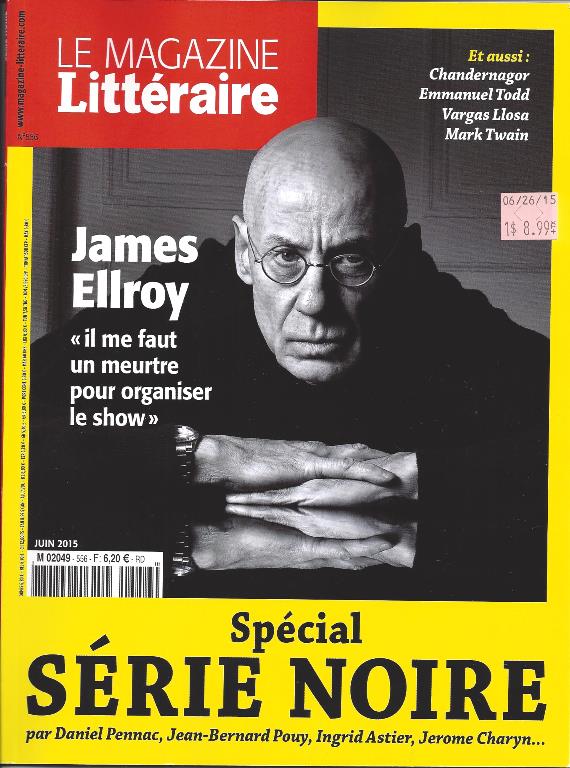 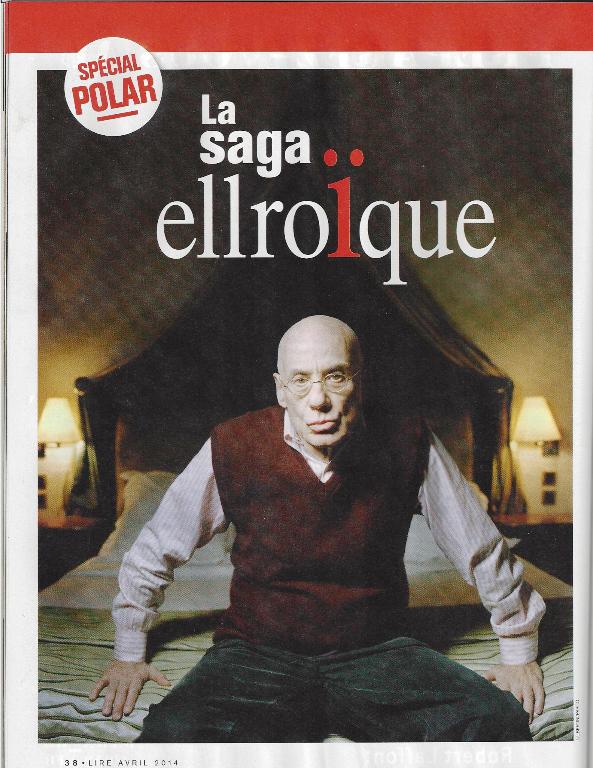 James
Ellroy, le justicier magnifique par Violaine
Binet "Je
ne
lis plus dorénavant, C'est dans mon sang. On n'apprend pas le gout du
sang à un
tigre. Le tigre a faim, il a besoin de viande. C'est moi le tigre. Je
suis le
tigre du roman noir.”
Tôi đếch đọc nữa. Có sẵn trong máu. Người ta đâu dạy hổ mùi máu. Nó đói, nó cần thịt sống. Tớ là con hổ đó. Tớ là con hổ của tiểu thuyết đen. 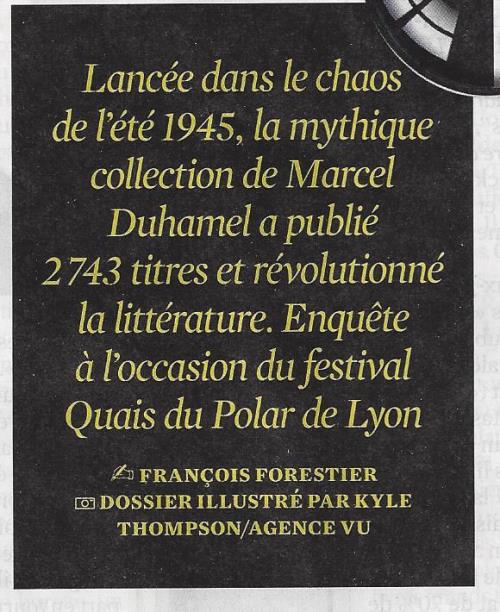 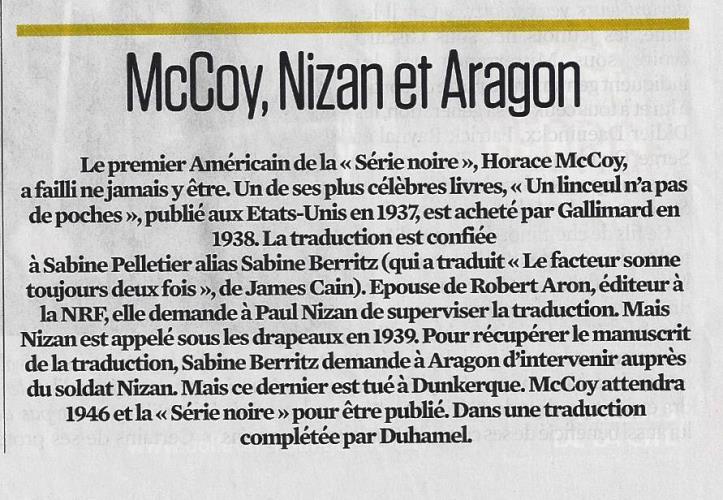  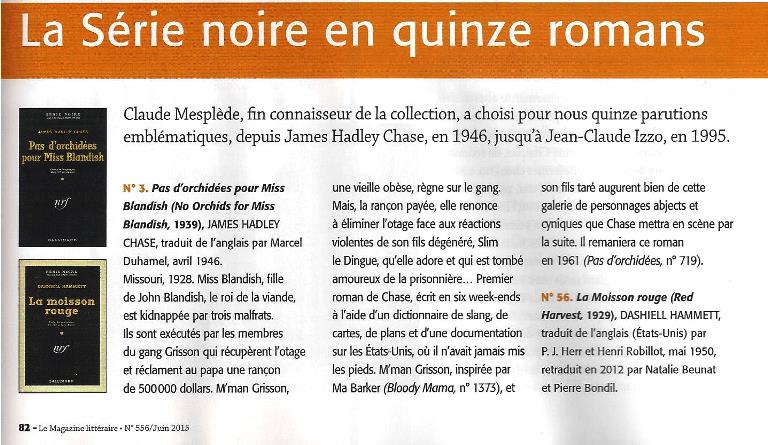 Note: Bức hình GGM bị bầm mắt, bạn NL gửi cho, là từ số báo này. V/v cú Vargas Llosa thoi Garcia Marquez, người viết tiểu sử của GM viết: Tình bạn giữa
họ chấm dứt khi Vargas Llosa thoi Garcia Marquez đến bất tỉnh, ở hành
lang một
rạp hát, do GM lăng nhăng với bà vợ của ông. Vargas Llosa phán, đây là
cú đấm nổi
tiếng nhất trong lịch sử Mỹ Châu La Tinh, “the most famous punch in the
history
of Latin America”, nhưng không đưa ra lý do. 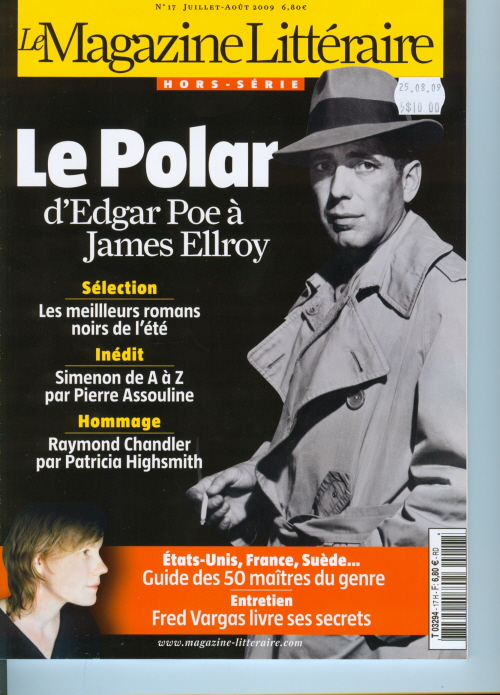 Số báo này
có quá nhiều bài tuyệt cú mèo. Bài về Giáo Đường, của Faulkner, khui ra
một chi
tiết thật thú vị: Cuốn Pas d'Orchidées
pour Miss Blandish (1938) của J.H. Chase, đã từng được Hoàng Hải
Thuỷ phóng
tác thành Trong vòng tay du đãng, là
từ Giáo Đuờng bước thẳng qua. Cái từ
tiểu thuyết đen, roman noir, của Tây không thể nào dịch qua tiếng Mẽo,
vì sẽ bị
lầm, "đen là da đen", nhưng có một từ thật là bảnh thế nó, đó là
"hard boiled", dur à cure,
khó nấu cho sôi, cho chín. Cha đẻ của từ này, là Raymond Chandler, cũng
một
hoàng đế tiểu thuyết đen!
Bài viết về Chandler của nữ hoàng trinh thám Mẽo, Patricia Highsmith cũng tuyệt. Rồi bài trả lời phỏng vấn của Simenon, trong đó, ông phán, số 1 thế kỷ 19 là Gogol, số 1 thế kỷ 20 là Faulkner, và cho biết, cứ mỗi lần viết xong một cuốn tiểu thuyết là mất mẹ nó hơn 5 kí lô, và gần một tháng ăn trả bữa mới bù lại được! Bài trò chuyện với tân nữ hoàng trinh thám Tây Fred Vargas cũng tuyệt luôn: "Tôi chơi trò thanh tẩy" ["Je joue le jeu de la catharsis"]. Viết trinh thám mà là thanh tẩy! (1) Nhưng nhận xét sau đây, theo tôi, thật đáng đồng tiền bát gạo, về tiểu thuyết trinh thám đen Mẽo. Nó chắc chắn sẽ trở thành một lời tiên tri cho văn học Việt Nam. Phillipe Larbo & Olivier Barrot, trong cuốn Một cuộc du ngoạn văn học: Những lá thư từ Mẽo quốc, đã đưa ra nhận xét, chính cái khí hậu khởi đầu của nó, mới đáng kể: Khi ban bố luật quái quỉ, cứ rượu là cấm đó, nhà nước đã biến tất cả những người công dân của nó trở thành những kẻ phạm pháp. Và chăng, cái luật đó lại được hỗ trợ bởi chính cái gọi là lịch sử lập quốc chinh phục Viễn Tây, cứ thấy đất là cướp, thấy da đỏ là thịt, là hãm, là đưa đi cải tạo, kinh tế mới... Chính cái khí hậu ăn cướp đó, mở ra tiểu thuyết trinh thám đen Mẽo! (1) Bạn để ý coi, nó có giống y chang cái cảnh ăn cướp Miền Nam? (2) EXILES To be exiled
is not to disappear but to shrink, to slowly or quickly get smaller and
smaller
until we reach our real height, the true height of the self. Swift,
master of
exile, knew this. For him exile was the secret word for journey. Many
of the
exiled, freighted with more suffering than reasons to leave, would
reject this
statement. Mọi văn chương cưu mang trong nó “cái gọi là” lưu vong, cho dù nhà văn, hoặc là đi bụi vào lúc đôi mươi hay là chẳng bao giờ rời khỏi nhà! Có lẽ hai tên lưu vong đầu tiên, thì là A Đam và E Và. Điều này khỏi bàn cãi, nhưng nó lại dấy lên vài câu hỏi, không lẽ thằng nào, con nào đều là… "lưu vong"? “Đàng nào” thì cũng là Đàng Trong, đếch có Đàng Ngoài? Nói rõ hơn, cái ý niệm Đất Lạ có vài cái lỗ hổng ở trong nó? Đất Lạ là 1 thực thể địa lý mang tính khách quan? Hay là 1 cấu trúc tinh thần luôn trong dòng chảy? 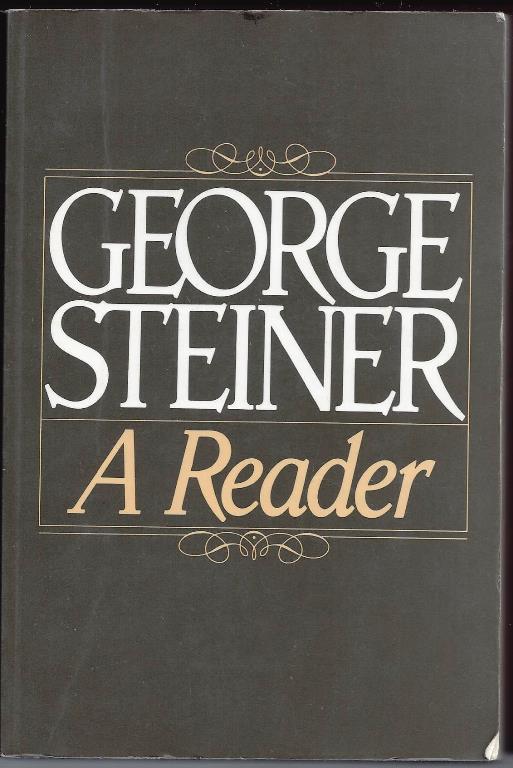 Epilogue [1961; from The Death of Tragedy] I want to
end this book on a note of personal recollection rather than of
critical
argument. There are no definite solutions to the problems I have
touched on.
Often allegory will illuminate them more aptly than assertion.
Moreover, I
believe that literary criticism has about it neither rigor nor proof.
Where it
is honest, it is passionate, private experience seeking to persuade.
The three
incidents I shall recount accord with the threefold possibility of our
theme:
that tragedy is, indeed, dead; that it carries on in its essential
tradition
despite changes in technical form; or, lastly, that tragic drama might
come
back to life. In some obscure village in central
Poland,
there was a small synagogue. One night, when making his rounds, the
Rabbi
entered and saw God sitting in a dark comer. He fell upon his face and
cried
out: 'Lord God, what art Thou doing here?' God answered him neither in
thunder
nor out of a whirlwind, but with a small voice: 'I am tired, Rabbi, I
am tired
unto death.' The bearing of this
parable on our theme, I take it, is this: God
grew weary of the savagery of man. Perhaps He was no longer able to
control it
and could no longer recognize His image in the mirror of creation. He
has left
the world to its own inhuman devices and dwells now in some other comer
of the universe
so remote that His messengers cannot even reach us. I would suppose
that He
turned away during the seventeenth century, a time which has been the
constant
dividing line in our argument. In the nineteenth century, Laplace
announced
that God was a hypothesis of which the rational mind had no further
need; God
took the great astronomer at his word. But tragedy is that form of art
which
requires the intolerable burden of God's presence. It is now dead
because His
shadow no longer falls upon us as it fell on Agamemnon or Macbeth or
Athalie. Cao Huy Khanh Sơ khảo 15 năm văn xuôi miền nam
Khởi Hành
Linh tinh
Milan Kundera có còn quan hệ gì không? Does Milan Kundera Still Matter? (Atlantic July/August 2015) GS Kinh
Tế, “Trùm” Trang "Việt Xì Tốp Đi
Thôi", dịch nhảm quá. Obituary: Christopher LeeNoblesse oblige 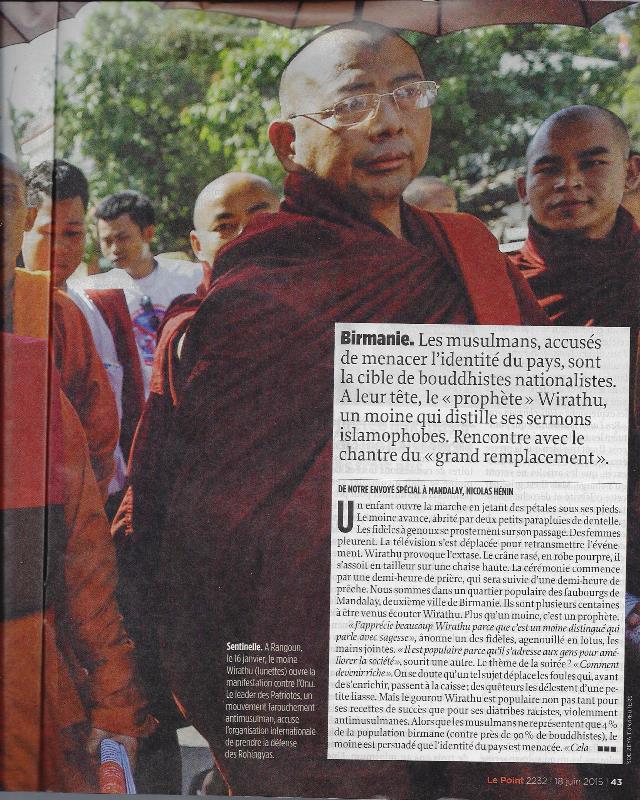 Ui chao, lại nhớ đến Phật Giáo Miền Nam ngày nào! Không khùng, nhưng đa số trốn lính, hoặc phò VC!  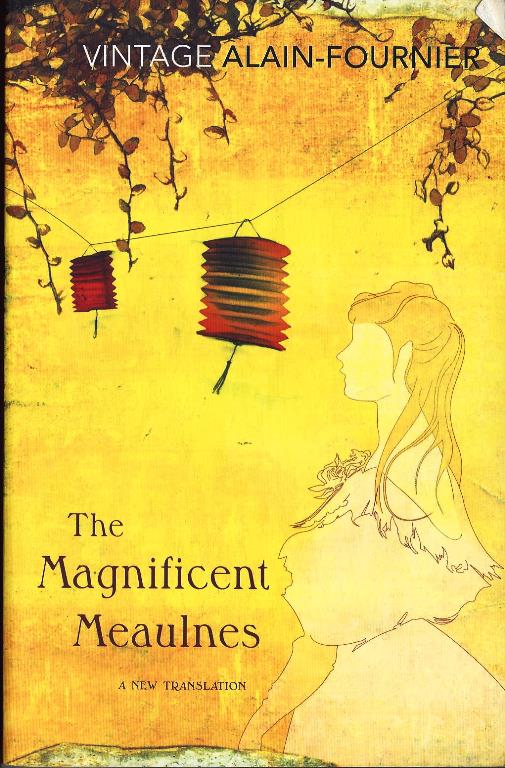 Cuốn trên,
GCC đọc hồi mới ra hải ngoại, thời gian đi bán bảo hiểm nhân thọ. Mượn
thư viện,
nhờ đó biết đến Fowles. Sau tìm hoài, không gặp. Bữa nay, gặp, đúng
ngày Father's
Day, có tí tiền còm ghé tiệm sách cũ. Gấu có thuổng 1 ý trong cuốn này,
trong
bài viết về World Cup. Nay, sẽ post
nguyên con! Lạ, là tay này
rất mê Anh Môn. Và cuốn Anh Môn, bản tiếng Anh, để kế ngay cuốn trên,
để chờ
GCC cầm lên. Gấu có mấy bản tiếng Tẩy, chỉ thèm bản tiếng Anh! Miền Đã Mất
The Lost Domaine 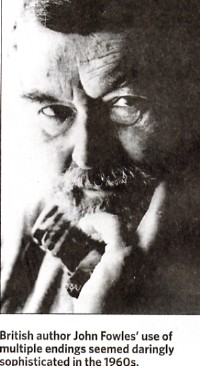 John
Fowles
1926-2005
Nhà văn Anh, tác giả
Người
Đàn Bà của Viên Trung Uý Pháp,
The French Lieutenant's Woman, và nhiều cuốn nổi tiếng khác như The
Collector, Kẻ
Sưu Tập, Magus… Lỗ Giun [Wormholes, tập tiểu luận] đã mất vì bịnh tim
ngày 5 Nov, thọ 79 tuổi.
[Hình Torontor Star] Tác phẩm
Go on, run
away, but
you would be far safer if you stayed at home.The Collector The Aristos The Magus The French Lieutenant's Woman Poems The Elbony Tower Shipwreck Daniel Martin Islands The Tree The Enigma of Stonehenge Mantissa A Short Story of Lyme Regis A Maggot Lyme Regis Camera. * Trong Tựa đề cho những bài thơ, Foreword to the Poems, John Fowles cho rằng cơn khủng hoảng của tiểu thuyết hiện đại, là do bản chất của nó, vốn bà con với sự dối trá. Đây là một trò chơi, một thủ thuật; nhà văn chơi trò hú tim với người đọc. Chấp nhận bịa đặt, chấp nhận những con người chẳng hề hiện hữu, những sự kiện chẳng hề xẩy ra, những tiểu thuyết gia muốn, hoặc (một chuyện) có vẻ thực, hoặc (sau cùng) sáng tỏ. Thi ca, là con đường ngược lại, hình thức bề ngoài của nó có thể chỉ là trò thủ thuật, rất ư không thực, nhưng nội dung lại cho chúng ta biết nhiều, về người viết, hơn là đối với nghệ thuật giả tưởng (tiểu thuyết). Một bài thơ đang nói: bạn là ai, bạn đang cảm nhận điều gì; tiểu thuyết đang nói: những nhân vật bịa đặt có thể là những ai, họ có thể cảm nhận điều gì. Sự khác biệt, nói rõ hơn, là như thế này: thật khó mà đưa cái tôi thực vào trong tiểu thuyết, thật khó mà lấy nó ra khỏi một bài thơ. Go on, run away... Cho dù chạy đi đâu, dù cựa quậy cỡ nào, ở nhà vẫn an toàn hơn. Nhi [Nhi, không phải Nhị, theo như 1 bài viết của Hồ Nam, về Mai Thảo, trên Gió O. Tên 1 cô gái, Gấu đã lầm, là Nhị Hà, sông Hồng]
John Fowles,
nhà văn Anh, khi được hỏi tại sao ông lại gọi cuộc phỏng vấn ông, là
một
"Unholy Inquisition" (Pháp Đình Tà Ma), đã trả lời: Thì cũng giống một
chiến sĩ bị mật vụ Đức Gestapo, hay một kẻ vô thần bị mấy ông phán quan
của
Chúa, tra hỏi. Đâu có ai muốn "hoạn nạn" như vậy! John
Fowles, trong The Aristos: A Self-Portrait in Ideas, Poems...
nhân mùa World Cup 1966, đã đưa ra nhận xét: "Bóng đá gồm 22 cây gậy
[của tên ăn mày, như các cụ thường nói], đuổi theo một cái âm hộ; cái
chày của môn chơi golf là một dương vật cán bằng thép; vua và hoàng hậu
trong môn cờ là Laius và Jocasta, mọi chiến thắng đều là một dạng, hoặc
bài tiết hoặc xuất tinh." Có thể nói, văn chương nghệ thuật Tây phương
bắt đầu, bằng cuộc tranh giành một nàng Hélène de Troie.
[Laius là cha, Jocasta là mẹ mà Oedipus bị lời nguyền của con nhân sư, phải giết đi và lấy làm vợ. Jocasta sau treo cổ tự tử, Oedipus tự chọc mắt, làm người mù chống gậy đi lang thang giữa sa mạc]. Trước Cuộc Truy Hoan
Bóng đá, môn
chơi của sức mạnh, "thuộc về đàn ông", nhưng đàn ông tới cỡ nào, có lẽ
chỉ mấy ông tiểu thuyết gia, tức chuyên viên về một "hình thức sung mãn
nam tính" (G. Lukacs), mới tưởng tượng nổi. Nguyên con, như sau: 65 Games are
far more important to us, and in far deeper ways, than we like to
admit. Some
psychologists explain all the symbolic values we attach to games, and
to losing
and winning them, in Freudian terms. Football consists of twenty-two
penises in
pursuit of a vagina; a golf club is a steel-shafted phallus; the chess
king and
queen are Laius and Jocasta; all winning is a form either of evacuation
or of
ejaculation; and so on. Such explanations mayor may not have value in
discussing the origin of the game. But for most players and spectators
a much more
plausible explanation is the Adlerian one, that a game is a system for
achieving superiority. It is moreover a system (like money getting)
that is to
a certain extent a human answer to the inhuman hazard of the cosmic
lottery; to
be able to win at a game compensates the winner for not being able to
win outside
the context of the game. This raison d' être
of the game is most clearly seen in the games of pure chance; but many
other
games have deliberate hazards; and even in games technically free of
hazards the
bounce, the lie, the fly in the eye exist. The evil is this: from
instituting
this system of equalizing hazard man soon moves to regarding the winner
in it
as not merely lucky but in some way excellent; just as he now comes to
regard
the rich man as in some way intrinsically excellent. * Le Grand MeaulnesThe girl at the Grand PalaisAnh Môn
|
